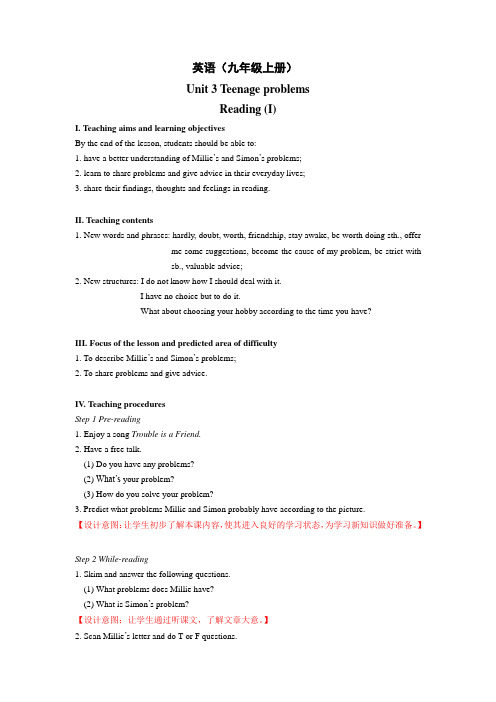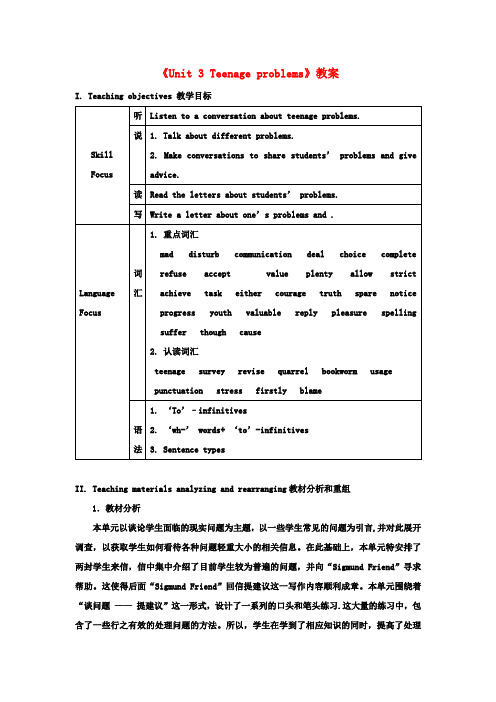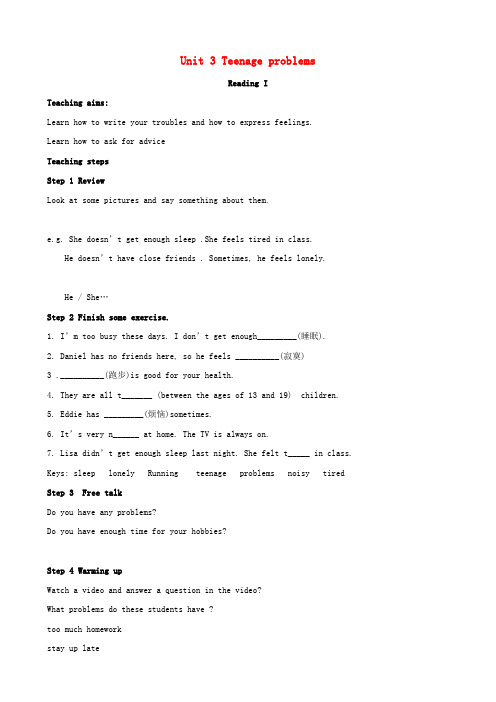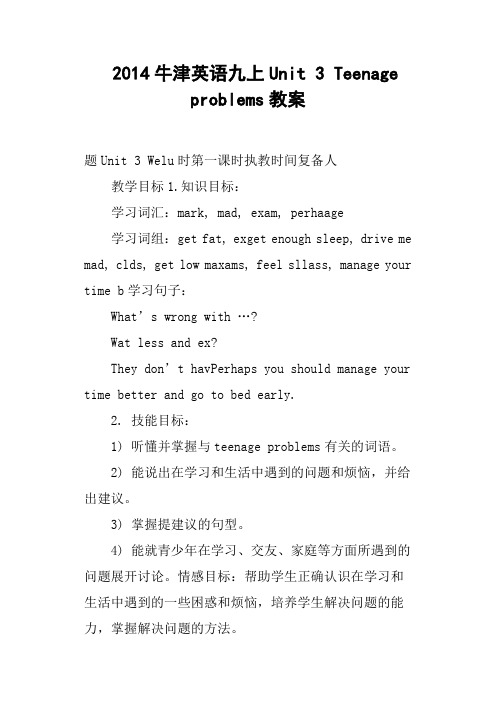9上 Unit 3 Teenage problem-1教案
Unit 3 Teenage problems reading (i) 教案

英语(九年级上册)Unit 3 Teenage problemsReading (I)I. Teaching aims and learning objectivesBy the end of the lesson, students should be able to:1. have a better understanding of Millie’s and Simon’s problems;2. learn to share problems and give advice in their everyday lives;3. share their findings, thoughts and feelings in reading.II. Teaching contents1. New words and phrases: hardly, doubt, worth, friendship, stay awake, be worth doing sth., offerme some suggestions, become the cause of my problem, be strict withsb., valuable advice;2. New structures: I do not know how I should deal with it.I have no choice but to do it.What about choosing your hobby according to the time you have?III. Focus of the lesson and predicted area of difficulty1. To describe Millie’s and Simon’s problems;2. To share problems and give advice.IV. Teaching proceduresStep 1 Pre-reading1. Enjoy a song Trouble is a Friend.2. Have a free talk.(1) Do you have any problems?(2) What’s your problem?(3) How do you solve your problem?3. Predict what problems Millie and Simon probably have according to the picture.【设计意图:让学生初步了解本课内容,使其进入良好的学习状态,为学习新知识做好准备。
九年级英语上册《Unit 3 Teenage problems》教案 牛津版

《Unit 3 Teenage problems》教案I. Teaching objectives 教学目标II. Teaching materials analyzing and rearranging教材分析和重组1.教材分析本单元以谈论学生面临的现实问题为主题,以一些学生常见的问题为引言,并对此展开调查,以获取学生如何看待各种问题轻重大小的相关信息。
在此基础上,本单元特安排了两封学生来信,信中集中介绍了目前学生较为普遍的问题,并向“Sigmund Friend”寻求帮助。
这使得后面“Sigmund Friend”回信提建议这一写作内容顺利成章。
本单元围绕着“谈问题——提建议”这一形式,设计了一系列的口头和笔头练习.这大量的练习中,包含了一些行之有效的处理问题的方法。
所以,学生在学到了相应知识的同时,提高了处理实际问题的能力。
而本单元的语法项目则是 1. ‘to’- infinitive (不定式) 2. ‘wh-‘ words+ ‘to’-infinitives (疑问词+动词不定式样) 3. Sentence types (句子类型,包括陈述句,疑问句,祈使句和感叹句)Welcome to the unit中的A部分以图片形式列举了学生生活中常见的问题。
(如没有充足的睡眠时间,没有足够的时间做作业,缺少好朋友等)。
同时呈现了一些新词汇,让学生进行图文匹配。
B部分是一项调查,要求学生把常见的问题根据个人实际情况按其大小进行排列。
Reading中的A部分是两篇学生的来信。
来信向我们展示了两位学生所遇到的困难并请求Sigmund Friend的帮助。
而B是对阅读文章中重点词汇的理解及运用。
C以记录表的形式,考查学生对两封书信总体意思的理解和把握。
而D则是对来信所作的回复。
该环节的设计,不仅再一次巩固了A的内容,也是对学生的一次写作训练。
Vocabulary向学生介绍单词get的一词多义性。
其中A要求学生用其他所提供的单词来替换get,使学生初步了解get的多层含义。
牛津译林版九年级上册Unit3《Teenageproblems》(reading1)说课稿

牛津译林版九年级上册Unit 3《Teenage problems》(Reading 1)说课稿一. 教材分析《牛津译林版九年级上册Unit 3 Teenage problems(Reading 1)》是一篇关于青少年问题的阅读文章。
文章主要讲述了一个青少年在成长过程中遇到的各种问题,如学习压力、与父母沟通、朋友之间的关系等。
通过这篇文章,学生可以了解到青少年成长过程中可能遇到的问题,并学会如何面对和解决这些问题。
二. 学情分析九年级的学生正处于青春期,他们面临着与文章中相似的问题。
因此,他们对这篇文章的主题会有共鸣,学习兴趣会比较浓厚。
然而,由于他们的英语水平不同,有的学生可能对文章中的一些词汇和语法结构理解起来有一定的困难。
三. 说教学目标1.知识目标:学生能理解文章的主要内容,掌握文章中的一些重要词汇和短语,如“pressure”、“communicate”、“relationship”等。
2.能力目标:学生能用英语简单描述青少年面临的问题,并学会如何解决这些问题。
3.情感目标:学生能认识到青少年时期的重要性,学会珍惜时光,积极面对生活中的困难。
四. 说教学重难点1.重点:学生能理解文章的主要内容,掌握文章中的一些重要词汇和短语。
2.难点:学生能用英语描述青少年面临的问题,并学会如何解决这些问题。
五. 说教学方法与手段1.教学方法:采用任务型教学法,让学生在完成任务的过程中,提高英语听说读写的能力。
2.教学手段:利用多媒体课件、图片、卡片等辅助教学,激发学生的学习兴趣。
六. 说教学过程1.Pre-reading:教师通过提问引导学生思考青少年时期可能遇到的问题,激发学生的学习兴趣。
2.While-reading:学生速读文章,回答相关问题;教师引导学生详细阅读文章,讨论文章中的细节。
3.Post-reading:学生分组讨论,用英语描述青少年面临的问题及解决方法;教师学生进行汇报,给予评价。
牛津译林版九年级上册Unit3《Teenageproblems》(Task)说课稿

牛津译林版九年级上册Unit 3《Teenage problems》(Task)说课稿一. 教材分析《Teenage problems》是牛津译林版九年级上册Unit 3的一篇课文,主题是关于青少年问题的。
通过描述青少年在成长过程中所面临的各种问题,如学习压力、与父母关系、朋友关系等,让学生了解并关注这一年龄段所特有的困惑和挑战。
本节课的主要目标是让学生能够理解课文内容,掌握相关的语言知识,提高阅读理解能力。
二. 学情分析九年级的学生已经具备了一定的英语基础,能够听、说、读、写一些简单的英语句子。
但他们在阅读理解方面还存在一定的困难,特别是对于一些长篇的文章。
因此,在教学过程中,我们需要关注学生的阅读理解能力,引导他们通过关键词、句子来理解文章的大意。
三. 说教学目标1.知识目标:让学生掌握课文中的关键词汇和句型,提高阅读理解能力。
2.能力目标:培养学生通过关键词、句子来理解文章大意的技巧。
3.情感目标:让学生认识到青少年时期所面临的问题,引导他们正确面对和处理这些问题。
四. 说教学重难点1.重点:课文的理解和相关的语言知识的掌握。
2.难点:对于一些长篇的文章,学生如何通过关键词、句子来理解文章的大意。
五. 说教学方法与手段1.教学方法:采用任务型教学法,让学生在完成任务的过程中,提高阅读理解能力。
2.教学手段:利用多媒体课件,为学生提供丰富的视觉、听觉材料,激发学生的学习兴趣。
六. 说教学过程1.导入:通过提问方式,引导学生谈论青少年时期所面临的问题,激发学生的学习兴趣。
2.阅读理解:学生自主阅读课文,回答相关问题,教师给予指导。
3.单词学习:学生通过课文,学习并掌握相关的词汇。
4.句型练习:学生模仿课文中的句型,进行口语练习。
5.小组讨论:学生分组讨论,分享自己面临的青少年问题,并尝试寻找解决办法。
6.总结:教师引导学生总结课文内容,加深对文章主题的理解。
7.作业布置:让学生写一篇关于自己青少年问题的文章,培养写作能力。
九年级英语上册《Unit3Teenageproblems》ReadingI教案(新版)牛津版

Unit 3 Teenage problemsReading ITeaching aims:Learn how to write your troubles and how to express feelings.Learn how to ask for adviceTeaching stepsStep 1 ReviewLook at some pictures and say something about them.e.g.She doesn’t get enough sleep .She feels tired in class.He doesn’t have close friends . Sometimes, he feels lonely.He / She…Step 2 Finish some exercise.1. I’m too busy these days. I don’t get enough_________(睡眠).2. Daniel has no friends here, so he feels __________(寂寞)3 .__________(跑步)is good for your health.4. They are all t_______ (between the ages of 13 and 19) children.5. Eddie has _________(烦恼)sometimes.6. It’s very n______ at home. The TV is always on.7. Lisa didn’t get enough sleep last night. She felt t_____ in class. Keys: sleep lonely Running teenage problems noisy tired Step 3 Free talkDo you have any problems?Do you have enough time for your hobbies?Step 4 Warming upWatch a video and answer a question in the video?What problems do these students have ?too much homeworkstay up lateget up earlyhave no spare time for their bobbiestheir parents are strict with them…Step 5 WordsMr Friend wants to help Millie and Simon. He has made a list of keywords in their letters. March the words on the left with the meanings on the right. Write the correct letters in the blanks.1. choice ___ a. reason2. stay up ____ b. be not sure if something is true3. imagine ____ c. making sure that rules are obeyed4. doubt ____ d. very useful or important5. cause ____ e. the right to decide which thing you want6. strict ____ f. start to have a skill, ability, etc.7. develop ____ g. go to bed later than usual8. valuable ____ h. form a picture in your mind of someone or somethingKeys: e g h b a c f dStep 6 ReadingTask 1 What should I doToday, we’ll have two Grade 9 students, Millie and Simon, to talk with us about their study and life.1. Listen to Millie’s letter and answer the question.What problem does Millie have?Key: She has a lot of homework every day and often stays up late. She hardly has any spare time for her hobbies.What do you think of her problem? Can you offer her some advice?2. Read the Millie’s letter and answer the question.What does she doubt?What does she dream of?Keys: She doubts whether it is worth spending so much time on homework.She dreams of a long holiday.3. Listen to Simon’s letter and answer the question.When does Simon play football?How do his parents think about it?Does Simon agree with his parents?Keys: After school.They do not allow him to play outside after 6 p.m.No, he doesn’t.4. Read the Simon’s letter and complete the table.Keys: his love of footballhoursIt is important to develop hobbies.Task 2 Listen to the radio again and finish the following exercise.My friend wants to keep a record of each student. Look at the cards and help him complete them. Put a tick (√)if Millie or Simon has that problem and a cross(×) if he or she does not have that problem.MillieProblemsFriendship _____Lots of homework _____Low marks _____Not enough time for hobbies _____Staying up late _____Strict parents _____Weight _____Keys: ×√×√√××SimonProblemsFriendship ______Lots of homework ______Low marks ______Not enough time for hobbies ______Staying up late ______Strict parents ______Weight ______Keys: ×××√×√×Task 3 Please come to the front and as Millie and Simon. Use the key words to help you.If you were Mr Sigmund Friend, what advice would you give Millie and Simon?I would advise Millie /Simonto …because….Step 7 Let students give suggestions to Millie and Simon..To Millie:1. Plan her day carefully.2. Make a list of all the homework she has to do.3. Choose one hobby to do each day.4. Focus on her favorite hobby.To Simon:1. Go home earlier.2. Don’t give up his hobby but don’t forget about his family, either.3. Play football for an hour or two.Step 8 Homework1. Read aloud the conversation in pairs.2. Find out the difficult sentences and discuss them with your classmates.2015.9.25。
牛津英语九上Unit 3 Teenage problems教案

2014牛津英语九上Unit 3 Teenageproblems教案题Unit 3 Welu时第一课时执教时间复备人教学目标1.知识目标:学习词汇:mark, mad, exam, perhaage学习词组:get fat, exget enough sleep, drive me mad, clds, get low maxams, feel sllass, manage your time b学习句子:What’s wrong with …?Wat less and ex?They don’t havPerhaps you should manage your time better and go to bed early.2. 技能目标:1) 听懂并掌握与teenage problems有关的词语。
2) 能说出在学习和生活中遇到的问题和烦恼,并给出建议。
3) 掌握提建议的句型。
4) 能就青少年在学习、交友、家庭等方面所遇到的问题展开讨论。
情感目标:帮助学生正确认识在学习和生活中遇到的一些困惑和烦恼,培养学生解决问题的能力,掌握解决问题的方法。
教学重点知识目标+技能目标教学难点表达个人问题及解决问题方法教学媒体录影机,多媒体,实物等教学过程Step1:预习指导与检测见导学案2:展示目标见导学案:课堂导学与互动任务一:校对预习检测答案(小组讨论、集体校对、识记并检查词组)。
任务二:学习漫画部分的对话。
1、Free talkWhat’s Eddie’s problem? Do you know?Can you guess why Eddie is getting fat?2、听录音回答问题。
What is Hobo’s suggestion?2.Why does Hobo tell Eddat too much?3、根据漫画部分内容填空。
Eddies tells Hobo that he _____ a problem. He is ____ _____. He asks Hobo to have a look aach. Hobo tellat he eats too ______ and he aat ______ and exercise ______. But Eddat he can ______d for HobWatch and pay aur pronuncia、两人一组表演对话。
九年级英语上册 Unit 3 Teenage problems Reading1教案
What does Millie doubt? (She doubts whether it is worth spending so much time on her homewor k.)
When does Simon play foot ball? (After school until late.)
How long does he play football?(hours)
What’s his idea?? (It is important to develop our hobbies.)
What does she dream of? (Sh e dreams of a long holiday.)
2. Read the letters m ore carefully then check the answers with the whole class.
3. Read the letter again and get the general idea of each part.
way to ask for help.
二次备课
For Class 8, ask the students to give some advice to Millie and Simon, then make a dialogue to talk about their own problems and offer some suggestions.
Model:
I have a problem. I do not know how to d eal with it. I feel worried /stressed----------I do not know how to achieve a balance between ---and----Can you offer me some suggestions?
九年级英语上册 Unit 3 Teenage problems Reading 1教案
I do not know how I should deal wi th it.
I have no choice but to do it.
I cannot imagine my life without hobbies.
I often doubt whether it is worth spending so much time on homework.
4. Do Simon’s parents understand him?
5. What problem does Simon have?
4、Watch and practice after the tape.
任务三:阅读提升。
根据Millie和Simon的来信内容,说说自己常遇到的一些困惑和烦恼。
Teenage problems
教学目标
1.知识目标:
学习词汇:deal, choice, but, awake, hardly, imagine, doubt, worth, suggestion, cause, strict, schoolwork, valuable, friendship, list,
Growing up may be difficult. We may have many problems.和What problems?
If we have some problems, where can go to ask for some advice?
任务二:阅读课文。
1、播放第一部分的录音,了解书信的大意。
StБайду номын сангаасp2:展示目标见导学案
Step3:课堂导学与互动
任务一:读前准备。
9AUnit3Teenageproblems第1课时教案.pdf
Unit3 Teenage problemsWelcome to the unit鲁河中学陈寿红Teaching objectives:1.To talk about problems and their causes2.To think about personal problems and how to deal with them.Teaching procedures:Part A1.Explain that most teenagers have problems. Tell students that if they ever need totalk about their problems, they should talk to their teachers, friends or family. Tell students that having a problem is nothing to be ashamed if ----everyone has worries from time to time.and “quarrel”. For stronger classes, ask the students to explain 2.Revise “noisy”what these two words mean. For weaker classes, explain that these words mean “full of noise” and “argue”.3.Ask students to work in pairs to complete Part A on Page 39. Once all studentshave finished, ask one student at a time to read out what they have written. Listen for mistakes and mispronunciation.Part B1.Tell students you want to do a survey of the problems that students in the classhave. Write the following headings on the board:Not enough sleep Not enough time to do homework Too noisy to study LonelyArgue with cousin/classmate/parent Parents are always busyRead out each problem in turn, and ask students to raise their hands if they have this problem. Make a tally of the problems that students have. This will reinforce a group feeling. Finally, make a note of the biggest problem the class has. Write the following on the board:“The biggest problem Class …Grade ... has is …”2.Explain that part B is different from the previous exercise, as students have torank how big these problems are in their lives.Explain to students that number 5 means that this is a big problem for them while number 1 means it is a small problem.3.Tell students to complete Part B on their own. You may want to give the exerciseas homework, as students may feel comfortable writing about their problems in private. You could ask volunteers to give their answers but do not force students.If there are no volunteers, do not go over the answers to this exercise with the class. Keep the students’ answers confidential.4.For stronger classes, a sk students to add what they consider to be the biggestproblems teenagers face to the list if these are different to those on the list.Exercise:一. 选用所给词组的适当形式填空get a good mark, get some help from, get enough sleep, get excited, get a bus, get married1. My uncle ______________ last year.2. Did you hear Simon __________________ in the exam?3. You didn’t ______________,did you?4. The audience _____________ when they saw Hello Kitty.5. My father _____________ to work every day.6. Shall we ________________ from an adviser?Homework:课后笔记:。
牛津英语九上Unit3《teenage problems》教学设计-优秀教案
3.Kitty:The TV is always on at my home.The noise drives me mad.
4.Daniel:I don’t have any close friends.Sometimes I feel lonely.
2.单元(或主题)学习目标与重点难点
(1)学生能够理解本单元的重点单词、短语和句子。
(2)学会表达自己的烦恼和情感。
(3)学会向别人寻求建议。
(4)学会运用连接代词和连接副词引导的宾语从句。
(5)学会写一篇新关于如何解决青少年问题的建议。
3.单元(或主题)整体教学思路(教学结构图)
本单元分7课时展开教学。
() 3. He told me the news in a low_______.
A. soundB. noiseC. voiceD. noises
() 4. It’s unhealthy for you to drink ________wine.
A. many tooB. much tooC. too manyD. too much
1.Read the conversation in Part B and answer the questions:
(1) What is Millie’s problem?
(2) What should she do then?
2.Make a new conversation and act it out.
A. keepingB. drivingC. causingD. turning
() 2. The light is too bright. Please ________ a little.
- 1、下载文档前请自行甄别文档内容的完整性,平台不提供额外的编辑、内容补充、找答案等附加服务。
- 2、"仅部分预览"的文档,不可在线预览部分如存在完整性等问题,可反馈申请退款(可完整预览的文档不适用该条件!)。
- 3、如文档侵犯您的权益,请联系客服反馈,我们会尽快为您处理(人工客服工作时间:9:00-18:30)。
1. Preview the new words and phrases
2. Pre-learn Period 1:Comic strip&Welcome to the unit
情感态度与价值观:
Express problems and talk about solutions.
教学重点难点
The bookshelf is _____ _____ _____ it can’t put so many books on it.
(2)get low marks in exams得高分get high marks
(3)manageyour time better
作及物动词,意为"控制;对付;照管"。如:
Eddie has got a.He is getting. Hobo tells him not totoo much because it is. He also tells Eddie to try more.If Eddie does so, he willthe food他设法把它弄干净了。
The shirt was very dirty, but he______ ______ _______ it.
你应该学会如何控制好你的时间。
You should learn ______ ______ ______ your time.
( )4. To our disappointment(失望), the pool was _________for the whole time during our stay.
A. closedB. openC. cleanD.gone
板书设计
9上Unit 3 Teenage problems Comic strip&Welcome to the unit
2 finish the sentences in part A
3 read sentences one by one and explain some language points
(1)getenoughsleep
enough+ noun.
e.g.足够的水足够的食物
adj.+ enough
e.g.足够大可以上学足够高可以够到树上的苹果
ActivityFourDiscussion
What should (not) you do when you have some problems?
Activity Five:Exercises
Talk about their some problems in their daily life.
Look at some pictures to express teenage problems.
徐州市教学改革实验学校教师备课设计页
课题
9上Unit 3 Teenage problemsComic strip&Welcome to the unit
课型
New
教具
Tape- recorder ppt
总课时数
17
完成时间
9.18
教学方法
Free talk, Presentation, Practice, Consolidation.
教后反思
(上节课存在问题的解决情况、本课教学经验或问题描述、存在问题的原因分析、提出改进措施)
学生能认识自己的问题,但如何去解决还是个很大的问题,有的能采纳老师提出的建议,这对学习有很大的帮助。
(4). The TV is alwaysonat my home.我家电视总是开着。
Step3talk about how to deal with these problems
1 manage your time better and go to bed earlier
2 plan your time carefully and try to finish your homework quickly
主备人
Zhang Xizhi
授课时间
9.25
教学目标
知识与能力:
1. Talk about middle school students in dating, learning, the relationship with the family problem.
2.Think about personal problems and the methods to solve the problem.
教学活动内容
活动组织过程
改笔
Step 1Free talk
1. Do you have any problems in your daily life?
2. What are the problems?
Step 2 presentation
1 show some pictures to express teenage problems
课堂达标
一、根据中文提示、英文释义或句意,填写单词。
1. A ___________is a young person between 13 and 19 years old.
2.It’s___________(not healthy)for the children to eat too many sweets.
Fill in the blanks
Check the homework and the preview.
Talk about the problems in the Ss’ daily life.
Show the following problems to the Ss then
Discuss how to solve the problems in groups..
3 ask parents to turn down or turn off the TV
4 try to be friendly to others and chat with them after class
5 study harder and ask for teacher's help
6 ask parents to come home early
Language points:
(1)getenoughsleep
enough+ noun.
e.g.足够的水足够的食物
adj.+ enough
(2)get low marks in exams得高分get high marks
(3)manageyour time better
(4). The TV is alwaysonat my home.我家电视总是开着。
Talk about how to deal with these problems
1 manage your time better and go to bed earlier
2 plan your time carefully and try to finish your homework quickly
Master the use of the key words and main sentences.
talk about how to deal with these problems
Read the conversation in Part B and answer question
Listen to the tape and answer the following questions
Step 1
1. What problem does Eddie have? What is Hobo’s advice?
2.Why does Hobo tell Eddie not to eat too much?
Step 2Read and act it out
Step 3Fill in the blanks
1 manage your time better and go to bed earlier
2 plan your time carefully and try to finish your homework quickly
3 ask parents to turn down or turn off the TV
1. To revise vocabulary and expressions to describe teenage problems
2. To guess meaning from context
3. To master different ways of talking about teenage problems
4 try to be friendly to others and chat with them after class
5 study harder and ask for teacher's help
6 ask parents to come home early
Give some suitable suggestions.
The girl is good at managing her money.这个女孩善于理财
作不及物动词,意为"设法(终于)完成(某件困难的事)",其后通常接不定式,如:
Do you suppose you can manage to get me a passport?你认为你能给我弄到护照吗?
二、单项选择。
( )1. —Have you finished _________the story book?
